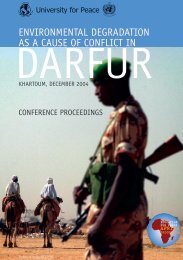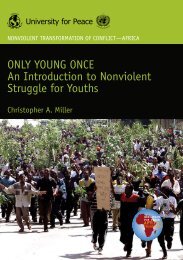who medicines strategy - libdoc.who.int - World Health Organization
who medicines strategy - libdoc.who.int - World Health Organization
who medicines strategy - libdoc.who.int - World Health Organization
Create successful ePaper yourself
Turn your PDF publications into a flip-book with our unique Google optimized e-Paper software.
COMPONENTS OF THE STRATEGY | 129Challenges remainingIrrational prescribing, dispensing, andconsumption of <strong>medicines</strong> exist even in thepresence of agreed strategies and policies forrational use, especially in developing countries.Although past research has identified theeffectiveness of many <strong>int</strong>erventions, particularlywhen used in combination, many countries havenot implemented or scaled up such strategies,possibly because of the expense involved. Thechallenge for WHO is to evaluate the costeffectivenessof various strategies and to advocatea package of priority cost-effective <strong>int</strong>erventions tobe adopted by countries. An additional challengeis the need to identify effective <strong>int</strong>erventions toimprove <strong>medicines</strong> use in hospitals and in thetreatment of chronic diseases such as HIV/AIDS indeveloping countries.Meeting the challenges 2004-2007Over the next four years WHO will:> continue to support <strong>int</strong>ervention researchprojects to evaluate the cost-effectiveness of<strong>int</strong>erventions to improve the rational use of<strong>medicines</strong>. The results of projects supportedin the last four years and the WHO rationalmedicine use database will be presented atthe 2 nd International Conference for Improvingthe Use of Medicines in April 2004 inThailand. The global agenda for the next fiveyears, to be decided at this conference, willinclude evaluation of the impact of nationalpolices on <strong>medicines</strong> use and the costeffectivenessof <strong>int</strong>erventions.> continue to work with INRUD to supporttraining programmes on promoting rationaluse of <strong>medicines</strong>, running fewer coursesbut with greater follow-up of participants’activities at country level.> increase efforts to improve the rational use of<strong>medicines</strong> for chronic diseases.OUTCOME INDICATORS1999 2003 2007No. of countries that have undertaken a nationalassessment / study of the rational use of <strong>medicines</strong>#REPORTING % TARGET#REPORTING % TARGETna na na 57/97 59% 60%











